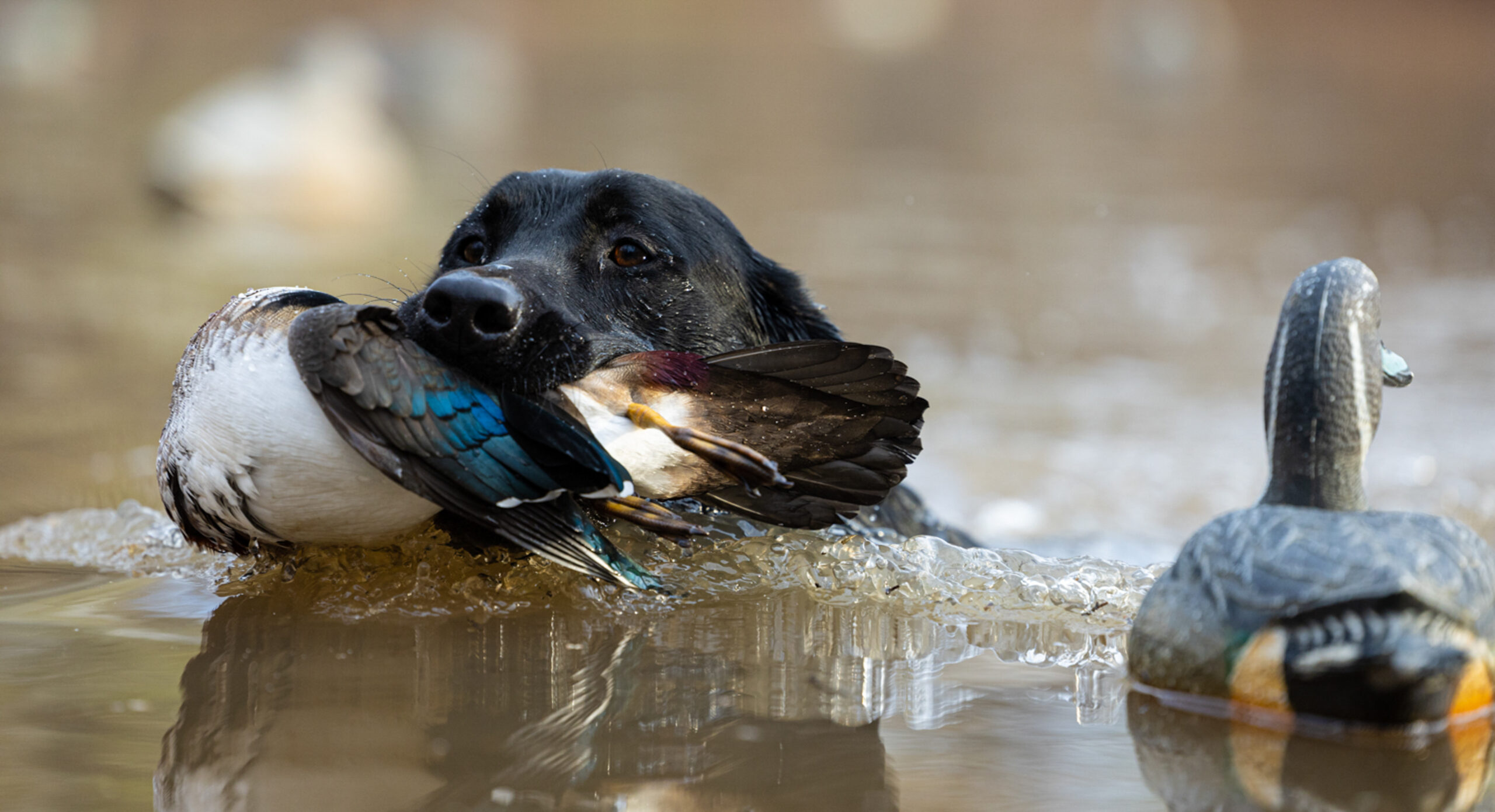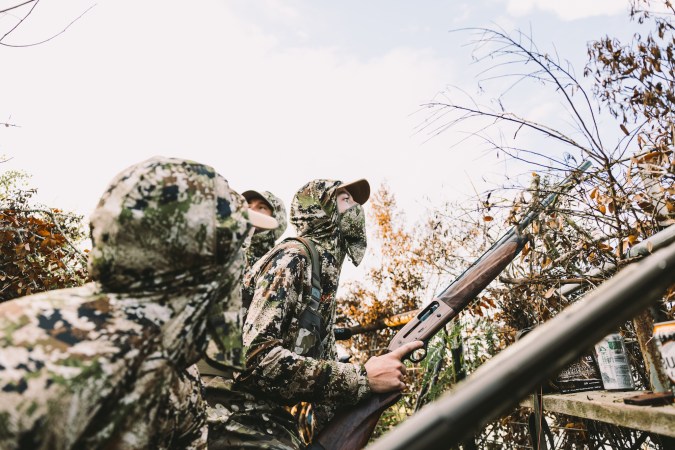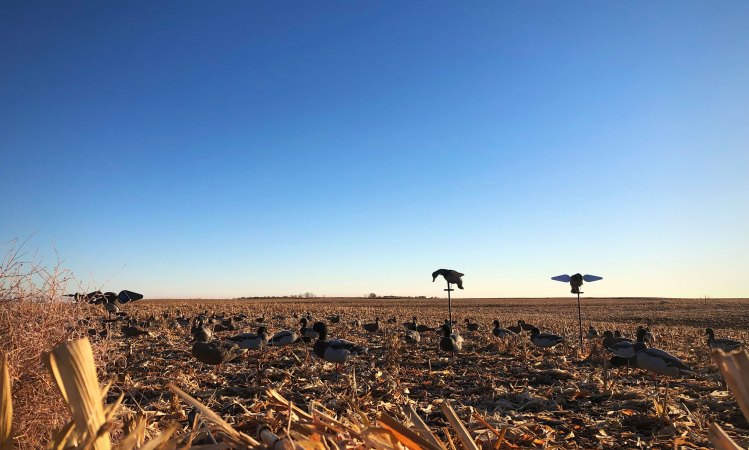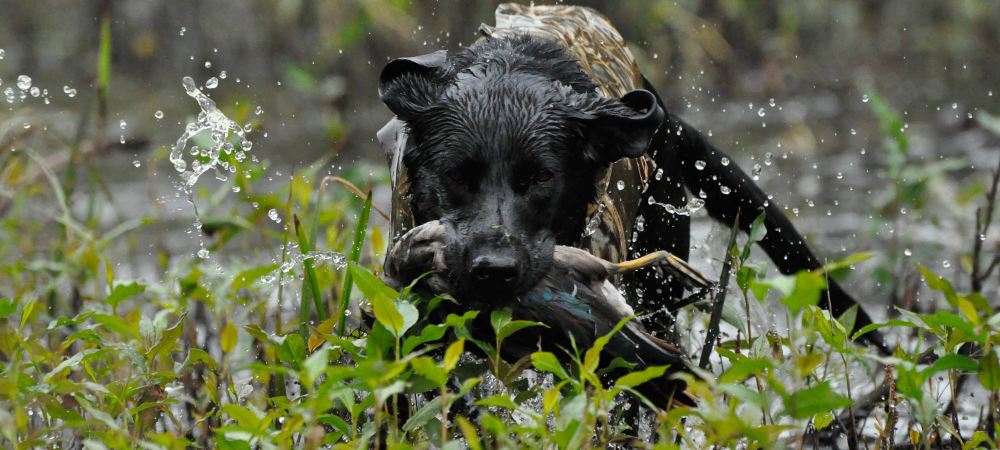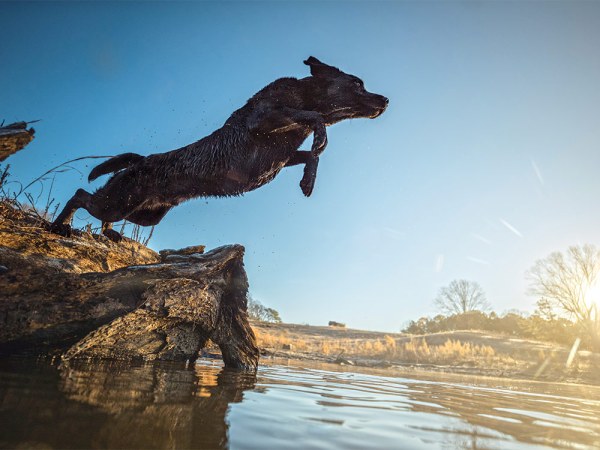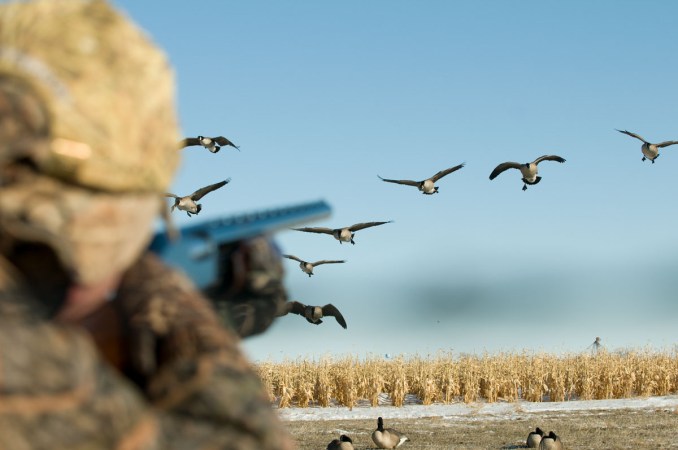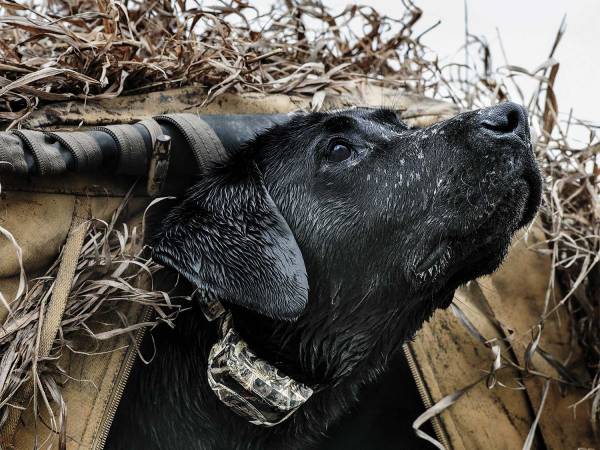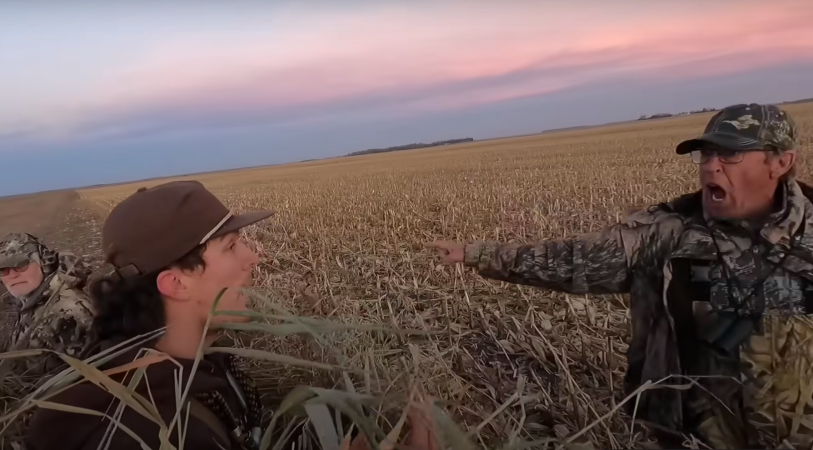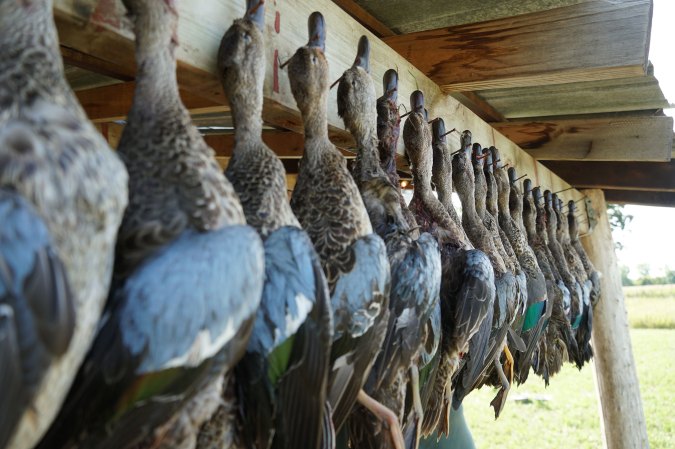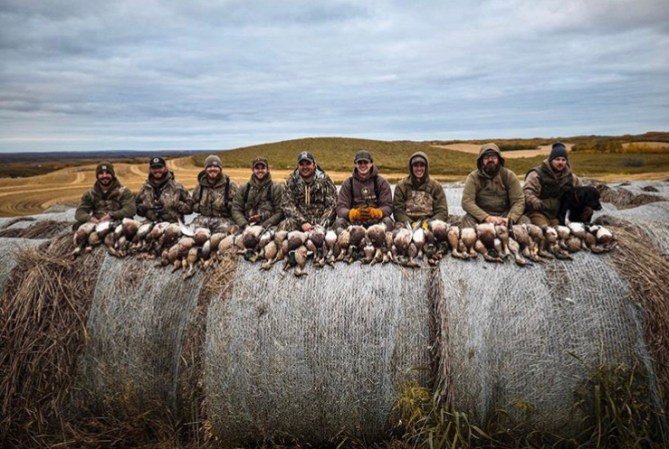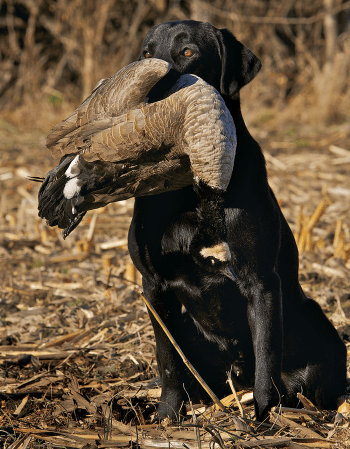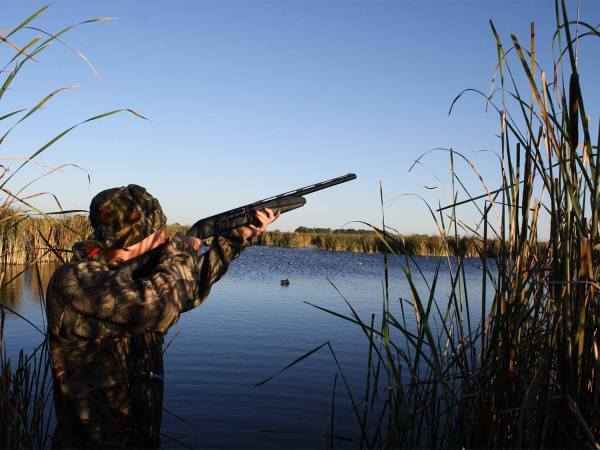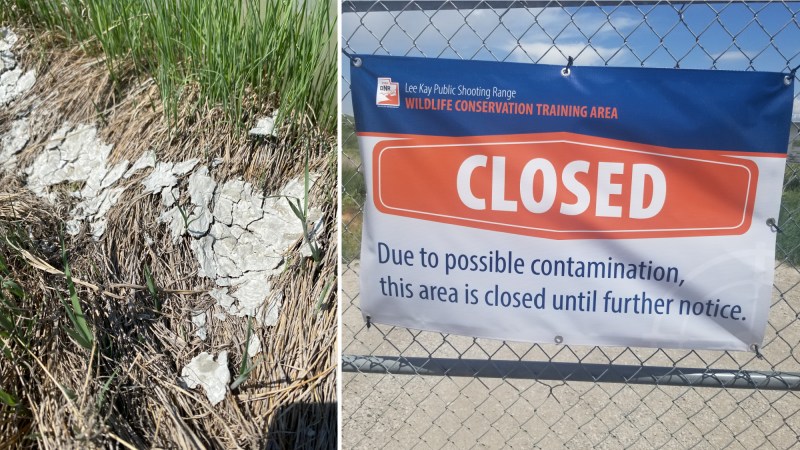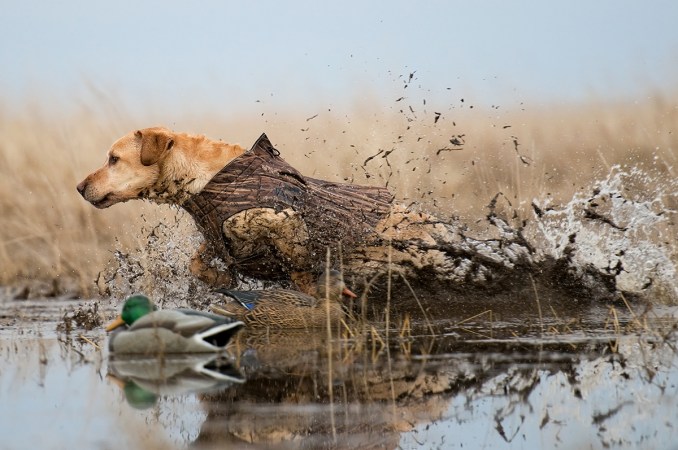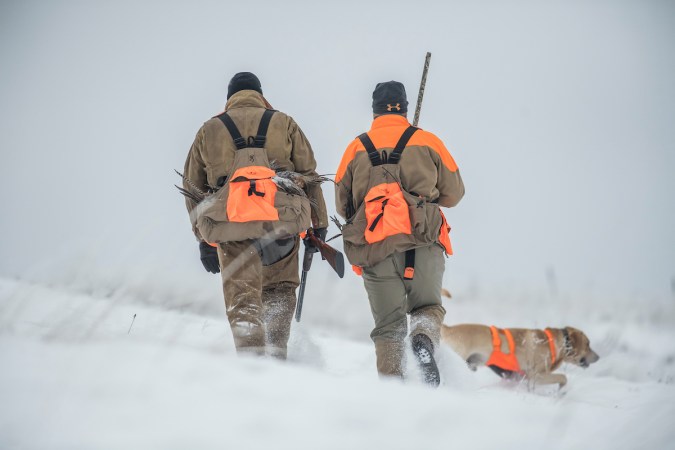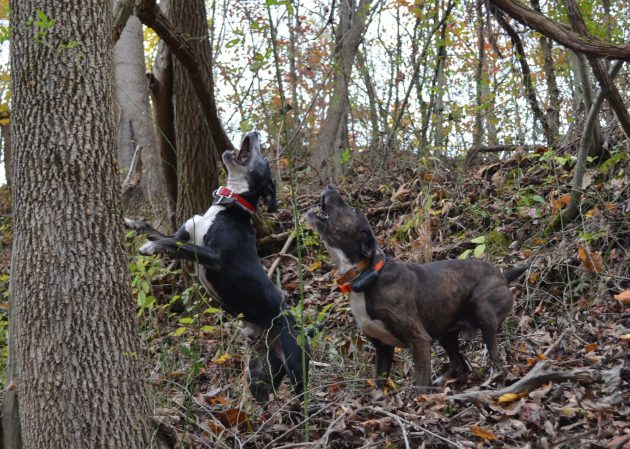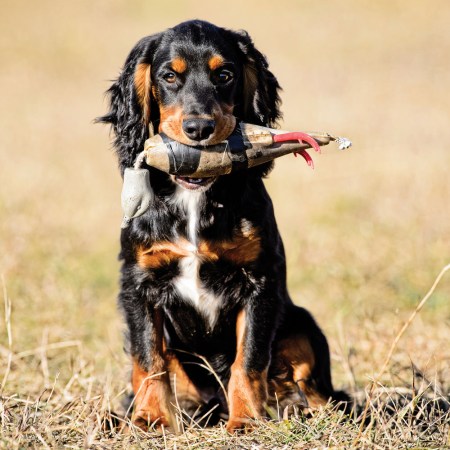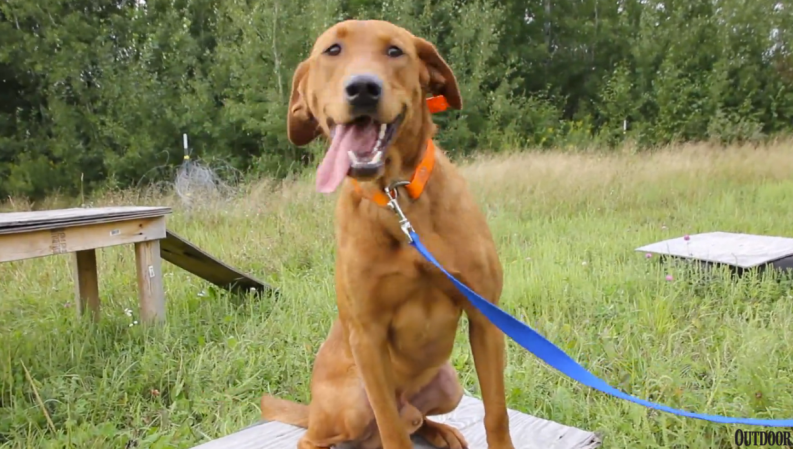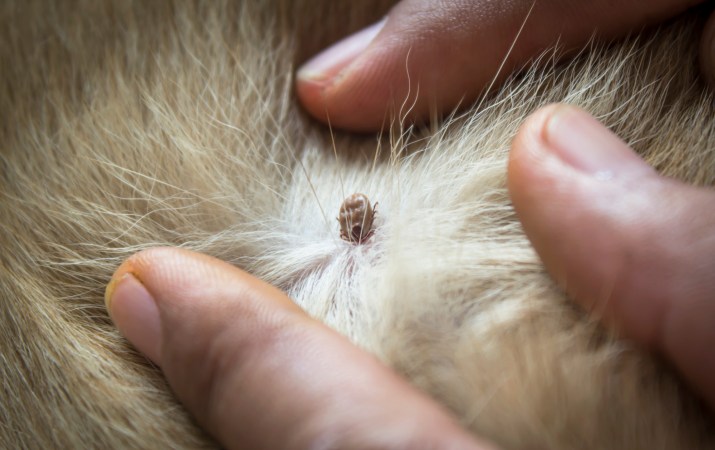The flock poured into the timber hole, the sound of their wingbeats growing loud in the still morning air. More than forty greenwings descended on our decoys and, when the shooting ended, eight lay on the water and the bank. It was the sort of sight you remember years later. But I had missed the entire thing.
Instead of shooting, I had been crouched at the doorway to the big wooden blind, one eye on the hunters inside and the other on my Lab, Hatchet, in the dog box. We were hunting at Habitat Flats in Missouri, and my guides had graciously agreed to let my 18-month-old pup pick up birds—on the condition that he was quiet and “100 percent” steady. So when Hatchet popped out of the unfamiliar dog box where I’d put him before legal light, I abandoned my spot in the shooting hole and put him right back. Now, instead of killing ducks at one of the best duck outfits in the country, I was babysitting my bird dog. But that’s the commitment you make in order to train a duck dog during his first few seasons.
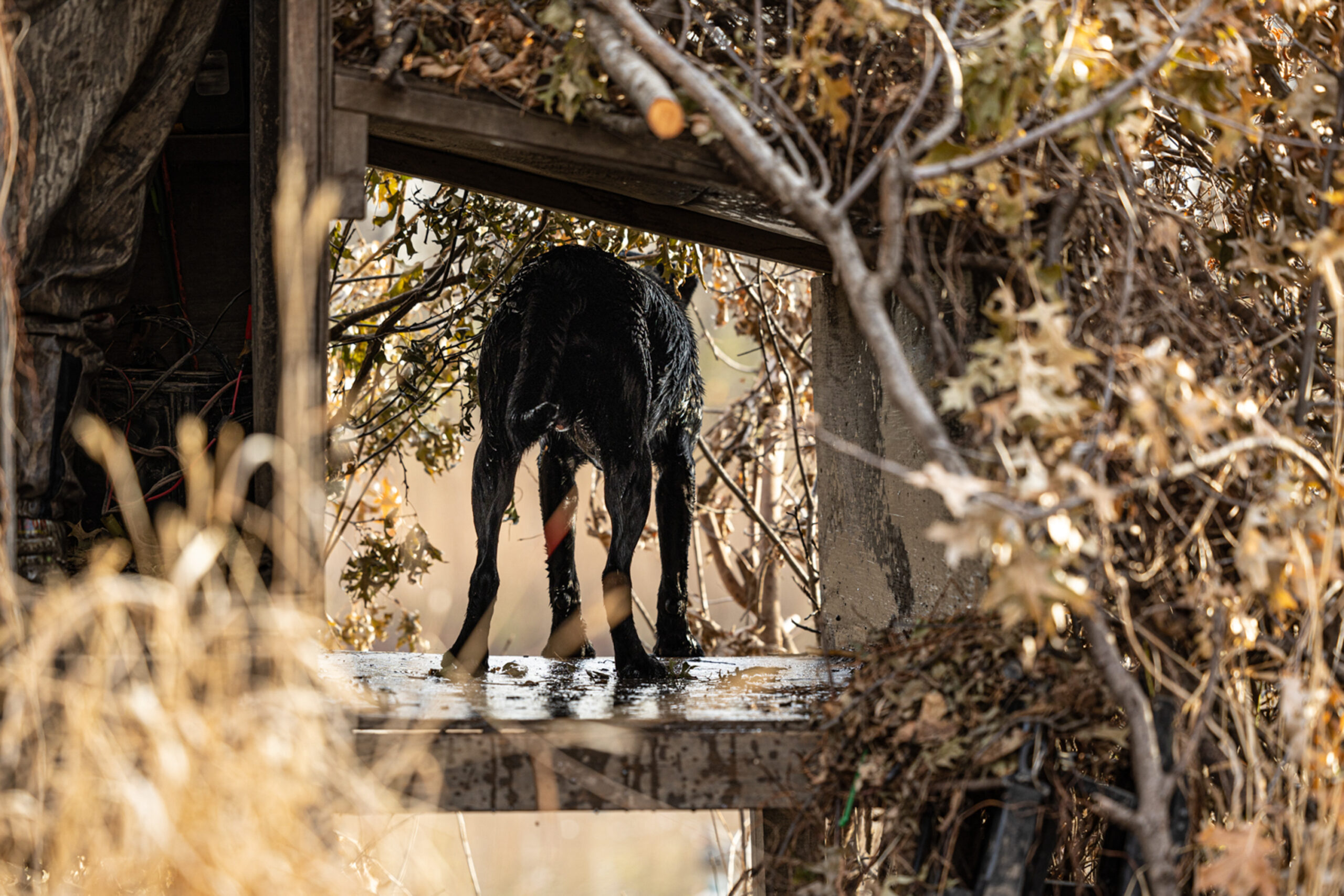
Painful though it might be for diehard duck hunters to continue training once the season opens, that patience is what every gun dog trainer I know advises: Handle first, hunt second. I’ve spoken with a dozen trainers in my efforts to train my own bird dog, and the following tips are all drawn from their collective wisdom. These tips should be helpful for a hunter who is training their first dog, but experienced duck hunters training their first pup in a decade might learn something, too.
After several more waves of ducks and some mild corrections—and no more breaking—I felt confident I could leave Hatchet alone in the dog box, which was separated from the shooting holes. When I finally pulled up on my first ducks of the day, I doubled on a greenhead and a woodie that splashed stone-dead into the pond—and right in front of Hatchet. He waited, silent and shaking in the dog box, for me to send him.
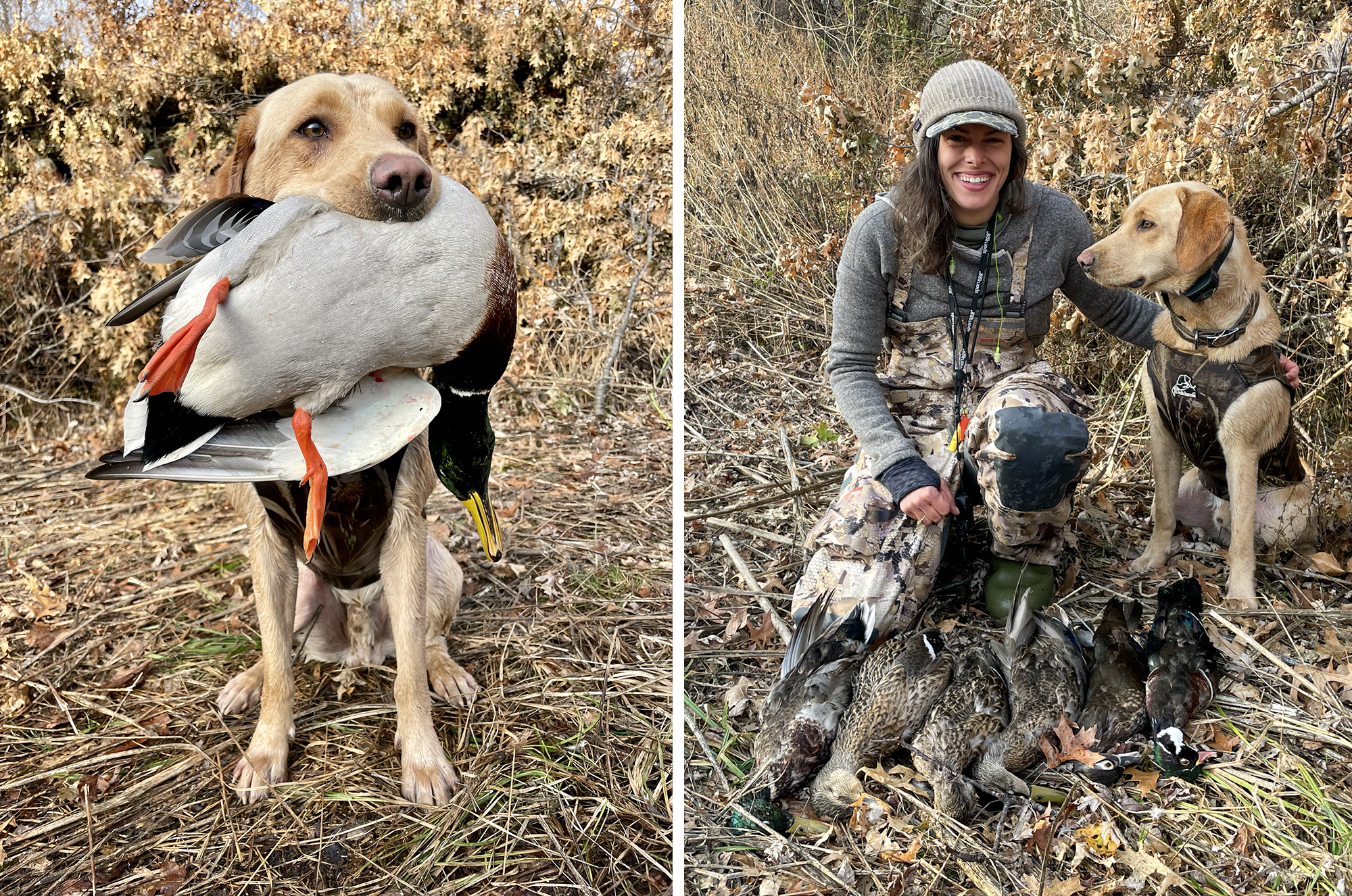
Don’t Rush It
No matter how much off-season training you do, a young retriever won’t perform like a seasoned one. So don’t fight the process, advises Kody Reynolds, head trainer of Habitat Flats Kennels in Marceline, Missouri.
“I wish everybody would just slow down and take their time,” says Reynolds, who oversees the training of 60 dogs each year and hunts two Labs of his own. “Enjoy the puppy stage and don’t push them so fast.”
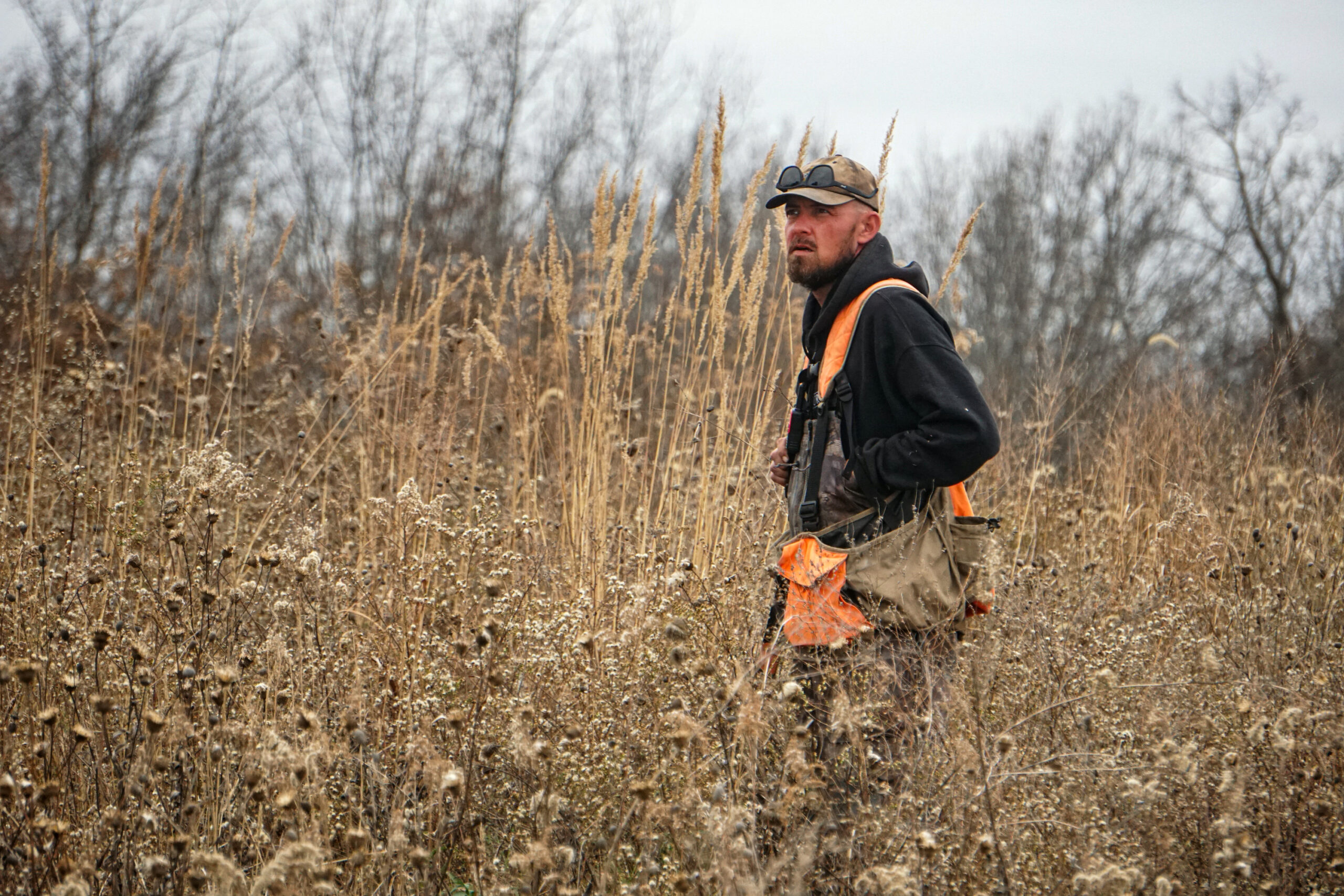
Once you create a problem—breaking at the shot, say—it will take you twice as long to fix it, warns Reynolds. Whining or barking while hunting is an especially thorny issue that’s critical to nip in the bud immediately. (Whining, something Reynolds and many other trainers say is difficult to squash because dogs don’t know they’re doing it, might be addressed early on by standing beside your dog while hunting and physically grabbing its muzzle and issuing a verbal correction.)
“People say, ‘I’ve got to have a hunting dog for this hunting season.’ Well, you’ve got that dog for the rest of its life—so no, you don’t,” says Reynolds. “You can make or break that dog in the first 10 to 12 hunts, especially.”
Train for How You Hunt
Before our hunt at Habitat Flats, I drilled for all the scenarios I thought we’d encounter there: extended place, kenneling in unfamiliar hides, steadiness to shot, and water retrieves among decoys. All that homework helped make his first experience hunting from a brushed-in dog box that much easier.
“Think through everything and prepare dogs for every situation,” says Joshua Parvin, a trainer with Cornerstone Gundog Academy. “Don’t … just run headlong into this, thinking your dog is ready to roll, and then all of a sudden things go south. It doesn’t go as expected and then you’re upset. We don’t want to get there because we want to set up our dogs for success.”
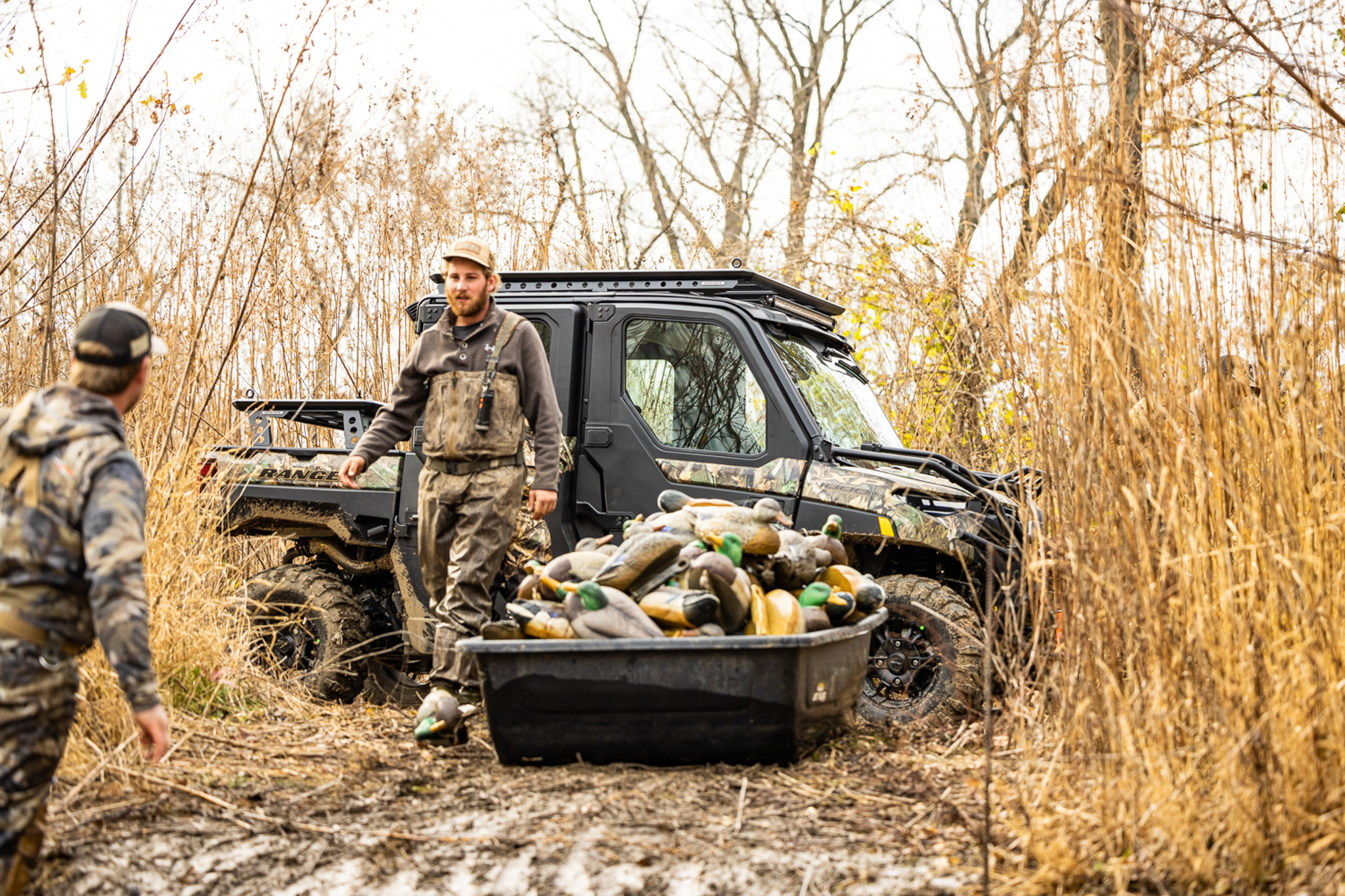
Parvin accomplishes this by slowly introducing variables as hunting season approaches to ultimately produce the most realistic hunting scenario possible, down to blowing a duck call. Combining too many new elements too quickly—as many waterfowlers do in a pup’s first season—can lead to bad habits or full-blown failure.
In his 52-week online course for DIY trainers, Parvin spends a week apiece on three different waterfowl scenarios: a small body of water, pocket water, and a field hunt. Practice the way you hunt most often, he advises, but prepare for all scenarios. That’s especially important when you get an invitation from a buddy or go on an outfitted hunt where you can’t easily control your setup.
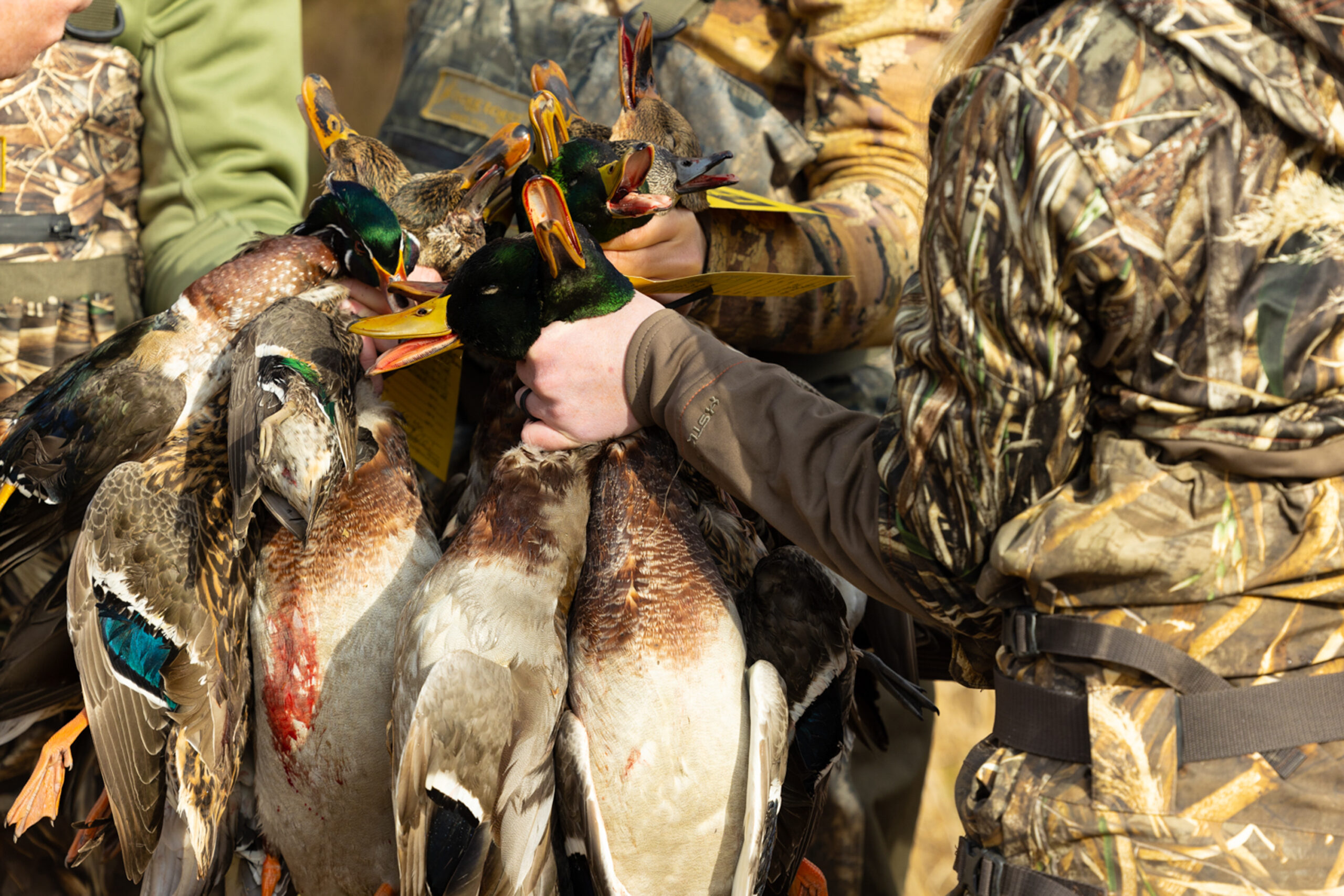
Plan Your First Hunt
When you do hunt your duck dog for the first time, bring one buddy. Make sure he’s a good shot, too, advises retriever trainer Tom Dokken. Your job is to handle your dog, and your buddy’s job is to kill ducks as quickly and cleanly as possible.
Choose a setup that allows you to stand beside your dog. You should be able to see your dog, restrain him with a leash or by hand, and issue quiet commands. Think of a high bank over a small farm pond, where your dog can easily mark ducks and reach cripples. Resist the urge to invite more hunters, do not hunt other dogs, and do not shoot unless your buddy is capable of handling your retriever.
Read Next: Tom Dokken Is the Godfather of Retriever Training in America
“It’s always about the dog,” says Reynolds. “Hunters have to learn to put the gun down and worry about the dog. You always want to make sure that dog is set up for success in a way that you’re paying attention to it and not the hunt.”
Keep your hunt short and sweet—30 minutes is plenty if the hunting is slow, says Dokken. Finish the hunt while your pup is still engaged and, above all else, make sure he has fun. You wouldn’t train for two hours straight, so don’t hunt your pup for that long.
Pack a Doggy Bag
It might be a hassle to carry a couple bumpers and a half-thawed teal in your blind bag, but you’ll be glad you brought them. When you plan to train a duck dog during the season, make sure to bring the following gear on each hunt:
- A leash or collar tab. No matter how confident you are in your dog’s steadiness, restrain him until you’re sure he’s bombproof in every scenario. I made this mistake on my dog’s fourth hunt, by which time I had grown complacent about his steadiness. As my hunting partner tried to finish a diver on the water, Hatchet couldn’t take the shooting and flapping anymore—and leapt off his platform, his leash slipping through my hands. The duck was still alive, my buddy wouldn’t shoot with a dog in the water, and we had to hope Hatchet would reach the duck before it dove. He made the retrieve, but it was an unsafe situation that also reinforced bad behavior: Breaking had earned him a duck. If he’d lost the bird, it would have been a critical early failure in cripple retrieval (on top of breaking). Avoid this pitfall altogether by securely leashing your pup until he can sit through everything from multiple sloppy shooters to delayed sends.
- A neoprene vest. Even if it doesn’t seem that cold, bring it. Young retrievers don’t yet have the fat or muscle to stay as warm as an older dog and a miserable morning shivering on place won’t endear your dog to duck hunting. If he needs it, you’ll be glad you brought it.
- A pocket full of rocks. This is an old trick, but a good one. Sooner or later, your pup will miss a mark on a downed duck and you won’t yet be able to handle him to it. Toss a rock near the floating duck, and the splash will draw his attention.
- Snacks. You don’t want to feed your dog before or during a hunt, but you don’t want him getting hypoglycemic, either. On longer or colder hunts, come prepared with snack cups of peanut butter or a squeeze bottle of honey. The morale boost from the treat won’t hurt.
- A bumper. If the hunting is slow—and it will be some days—give your dog a break with a few fun retrieves. It’s good practice, too.
- A frozen or recently killed bird. When possible, I’ll tuck a real bird (a dead one, obviously) into my bag. This is a trick I learned from Dokken, who stresses that no matter how bad your hunt goes, young duck dogs must be rewarded with, well, ducks. Hunt for an hour without killing a single bird? You can still end the hunt with a realistic retrieve. Put your dog on a cripple that never turns up? Plant the dead bird for him instead. Just keep in mind hunting regulations and bag limits if you pack a real duck into the field.
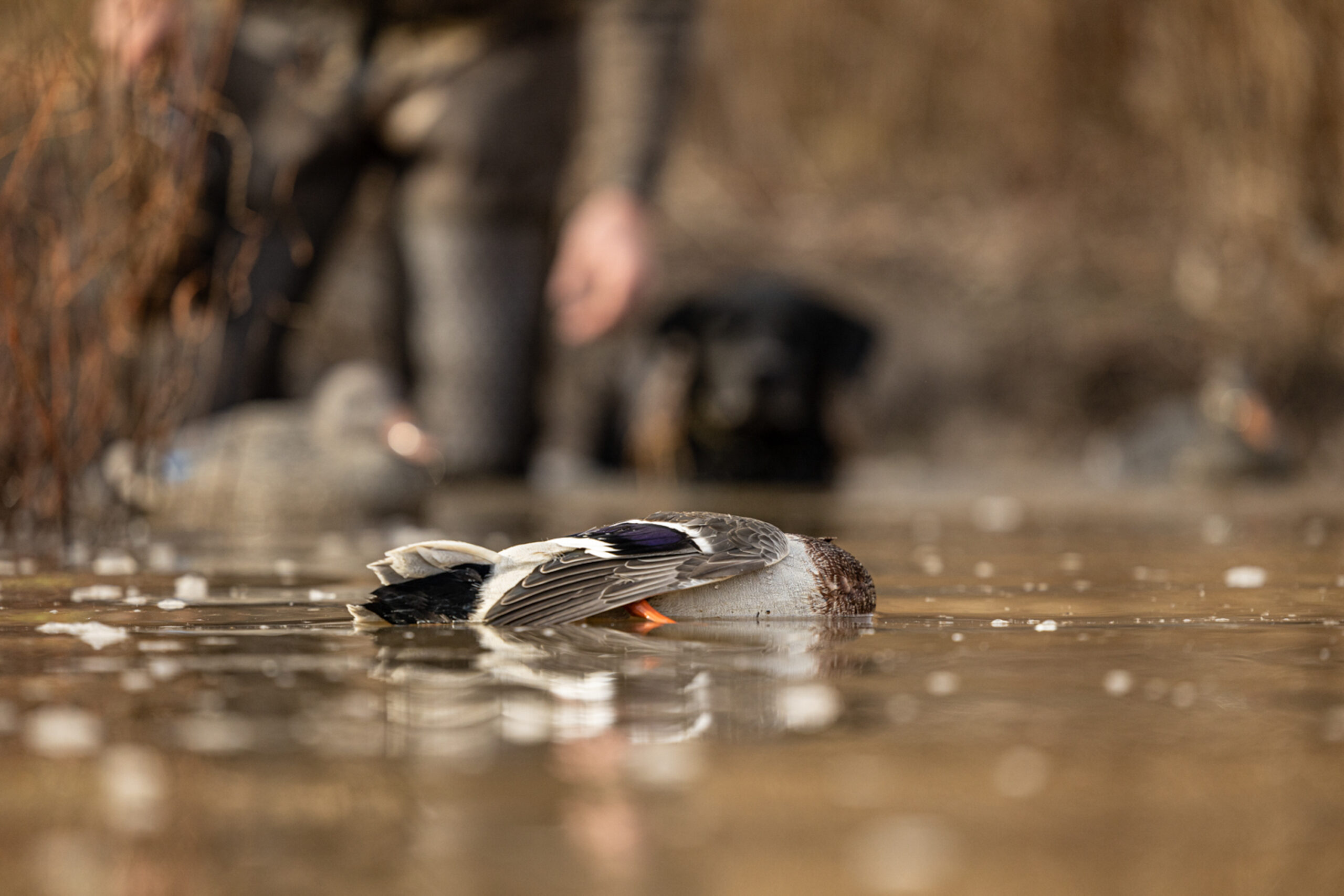
Be Honest with Outfitters (and Yourself)
Many waterfowl outfitters are wary of clients who want to hunt their dogs, and for good reason. Their job, as they see it, is to help you kill ducks. If your dog is breaking or splashing in the decoys—a frequent problem with client dogs—it’s difficult to kill ducks. So the best thing to do is be up front with an outfitter when you’re planning a hunt. When booking, explain that you want part of the hunt to be about training a duck dog. Then, be honest about your dog’s capabilities—and limitations.
The biggest problem with clients is simple obedience: Their dogs won’t stay in their hide, or even respond to recall commands. “It’s usually just the basics of obedience for the owner working their dog” that are lacking, says Reynolds. “Put in that little extra effort to make sure the dog’s ready.”
Well before the hunt, explain to your guide what your goals are for your dog (lots of retrieves), and what you’re willing to sacrifice to accomplish them (shooting ducks yourself). Then ask the right questions to make sure your dog can successfully hunt the setup your guide has planned. What kind of hide is available for your pup? Will he have to kennel in a dog box or can he sit on his MOMarsh platform? Will he be able to easily see birds? Can you stand beside him? Will the guide be hunting his dog? If so, will he honor your dog and let your dog get most of the retrieves?
Read Next: Best Duck Hunting Dogs
One of my guides at Habitat Flats brought his veteran retriever on our hunt as backup. It was the perfect introduction to hunting with another dog: His Lab honored my pup and picked up a duck that required handling in cover, in addition to picking up one of the eight teal. All told, Hatchet retrieved two-plus limits and earned high praise from the guide. “If everyone hunted their dogs the way you did,” he said as we packed up, “everyone’s dog would be welcome.”
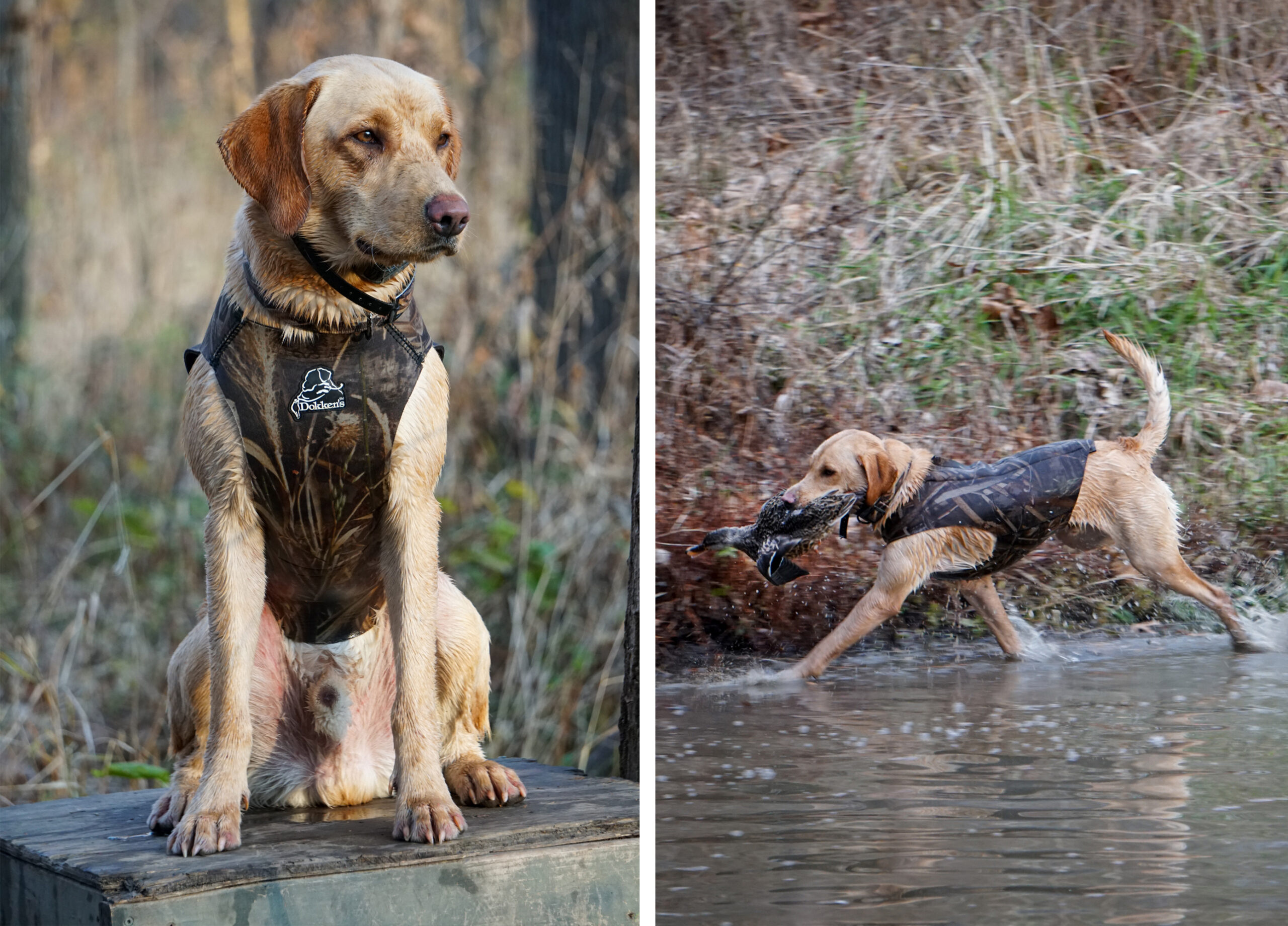
Troubleshoot Problems as They Arise
The next morning, Hatchet and I proceeded to burn nearly every scrap of good will we had earned. He didn’t break and he stayed quiet, but he started cheating around the bank instead of taking a direct line into the water, causing him to lose his marks. My pride from the day before turned to puzzlement, then frustration, and finally embarrassment. I desperately wished I had finished his “back” command, something we’d practiced on land but not yet in water.
When Hatchet started blindly searching for ducks I felt sure he should have seen fall, I tried clearing away brush from his dog box. When that didn’t work, I put him on the guide’s dog stand, hoping he’d have an unobstructed view of the pond. After that failed, I started heeling him to the pond edge, then sending him on retrieves. That worked a little better, but he continued to cheat and lose marks more often than not. The best solution was the last one: to stop hunting before I did more harm than good.
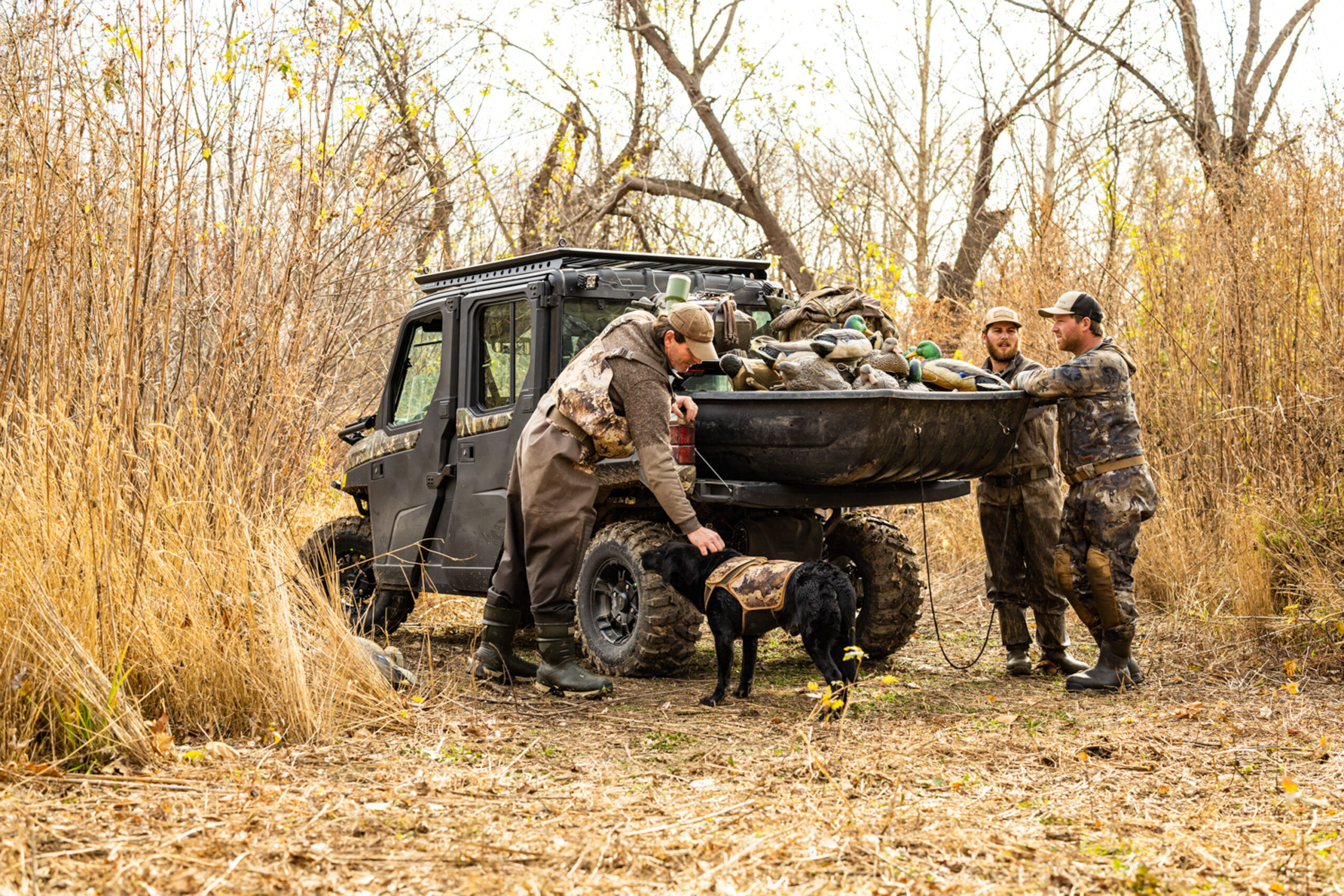
How to Train a Duck Dog for the Next Hunt
Mercifully, we had a veteran retriever with us to help pick up birds. Another guide whispered to me, “I don’t understand—he did so well yesterday.” But I did: We had more training to do.
Read Next: Your Retriever Will Teach You These 5 Life Lessons
While most pro trainers I spoke with recommend hunting your duck dog once he’s steady to shot and can retrieve to hand (including Dokken), Reynolds prefers to train a duck dog on blinds before their very first duck hunt. “They’ve got to be steady, and they must be able to handle and stop on a whistle,” he says. “That’s the absolute must-have.”
That morning I paid attention to Hatchet’s strengths and I took specific notes on where he was weak so I could develop a training. It had been fun to watch my bird dog succeed, but his failures—which were really my failures as a trainer and a handler—motivated me even more.

